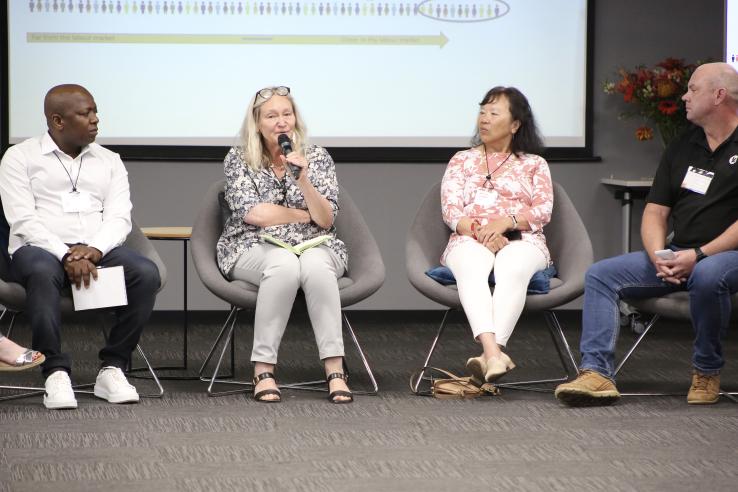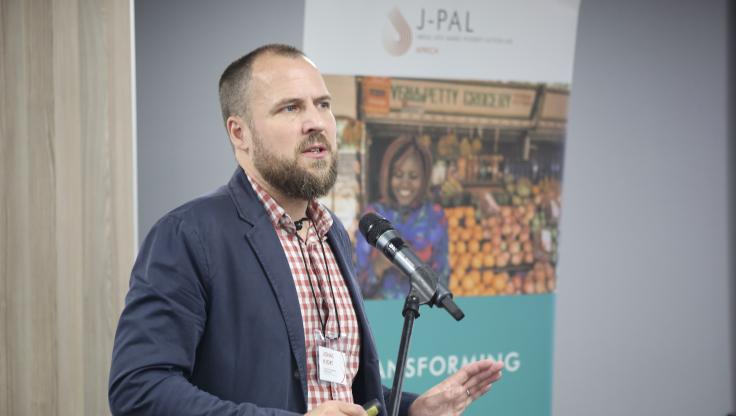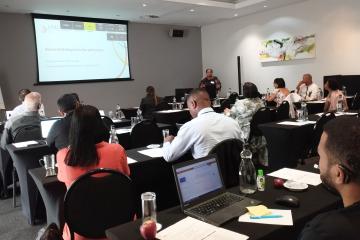
Tackling unemployment in sub-Saharan Africa with Evidence: Launching the Jobs and Entrepreneurship in Africa Portfolio

Roughly one-third of Africa’s 420 million youth, aged 15–35, are out of work and have stopped looking for jobs, another third have unstable employment, and only a small fraction—about one in six—have secure, stable, salaried positions. Sub-Saharan Africa’s population is also on track to double to 2 billion by 2050, driving unprecedented demographic growth. This makes the challenge of unemployment an even greater priority.
To tackle this challenge, J-PAL Africa has officially launched the Jobs and Entrepreneurship in Africa (JEA) Portfolio, supported by the generous seed funding from the Kuo Sharper Foundation. The portfolio aims to identify high impact and cost-effective strategies to promote growth for small and medium enterprises (SMEs) as a route to job creation. By forging new innovative research partnerships, sharing actionable insights, leveraging administrative data, and working hand-in-hand with policymakers and private sector leaders, JEA seeks to create lasting solutions to one of the continent's most pressing challenges.
The portfolio was launched on November 19, 2024, at a high-profile event in Johannesburg. The event brought together leading economists, policymakers, and entrepreneurs to bridge research and practice in addressing unemployment. The discussions yielded meaningful insights from experts on market access, innovative financing, services-led growth, input accessibility, and firm ecosystems that informed JEA's research agenda.
Why Africa’s jobs crisis matters
In his keynote address, Jonas Hjort, professor of economics at University College London and JEA’s scientific advisor, described the employment crisis as one of Africa’s most urgent challenges, second only to climate change. He highlighted how 82 percent of tertiary-educated youth in sub-Saharan Africa currently work in jobs without formal contracts or benefits, a stark indicator of the structural barriers facing job creation. Hjort emphasized the need for a paradigm shift: “Fixing growth, employment, and firm productivity is infinitely more complex than direct poverty alleviation through cash transfers. But if we succeed, the benefits will be transformative.”

Africa’s economic growth since the 1990s has lifted millions out of poverty, yet this growth has often failed to translate into stable, formal employment. According to speaker Murray Leibbrandt, director of the African Centre of Excellence for Inequality Research, this disconnect exists because when the economy grows, it doesn’t necessarily create new jobs at the same pace. He emphasized that while growth is essential for poverty reduction, it alone cannot solve deeper problems: many businesses remain small and struggle to expand, workers lack legal protections, and overall productivity remains low. Understanding these bottlenecks is critical to designing policies that can create more equitable and inclusive labor markets.
Despite these challenges, Africa’s economic trajectory holds tremendous promise. Dina Sherif, the executive director and senior lecturer at the Legatum Center for Development & Entrepreneurship at MIT, emphasized in her spotlight talk at the event that the continent represents the ‘final frontier’ for growth, driven by rapid urbanization and a youthful population. SMEs make up 90 percent of all businesses and drive most youth employment in the region, with women entrepreneurs leading the charge—Africa has the highest rate of female entrepreneurial activity globally at 24 percent, creating jobs while boosting innovation and community development.
Yet, translating this tremendous entrepreneurial potential into transformative employment gains requires addressing multiple systemic barriers that prevent firms from scaling and creating jobs.
Systemic barriers to job creation in Africa
These structural barriers were central to discussions during the first panel at the JEA launch event, where experts identified key challenges stalling SME growth and employment. A fundamental issue is market access—while the African Continental Free Trade Area exists, many businesses still struggle to reach customers beyond their immediate vicinity due to the high costs of doing business, difficulty finding information about potential customers and suppliers, and poor transportation networks. As Dina Sherif noted, addressing these market frictions would help create larger accessible markets for African businesses, driving sustainable job growth.
The issue of limited market reach is compounded by Africa’s reliance on trade over local production. As J-PAL affiliated professor Edward Asiedu, senior lecturer at the University of Ghana, explained many businesses prioritize importing and reselling goods instead of producing them locally, limiting opportunities for job-rich sectors like manufacturing to thrive. He also highlighted how talent migration compounds these challenges—as skilled workers leave the continent, firms struggle to access the human capital they need to grow and innovate.
Another critical challenge is the lack of financing options for SMEs, particularly in the form of equity financing. Unlike traditional loans, where businesses must repay the capital with interest regardless of their success, equity financing involves investors providing capital in exchange for ownership shares or a stake in the business. This model allows firms to secure the funding they need to expand without the pressure of immediate repayment. However, many SMEs struggle to attract and obtain this type of funding, limiting their ability to innovate, grow, and create stable employment opportunities.
These market frictions are particularly difficult for smaller organizations, which often face what Alex Beyers, special projects at from the Harambee Youth Employment Accelerator described as the dual challenge of acting as both “the lab and the factory.” They must simultaneously experiment with innovative solutions to address employment challenges (the lab) while running their existing programs at scale (the factory). This tension between innovation and execution at scale makes it particularly difficult for organizations to grow effectively.
Innovative responses to employment challenges
The event also celebrated several promising approaches to addressing the continent’s employment crisis. Kate Phillips, programme lead of the Presidential Employment Stimulus in South Africa shared insights from the Public Employment Systems (PES), which were crucial during the Covid-19 pandemic. She described how PES reinvented public employment through initiatives like the Basic Education Employment Initiative. The program, in partnership with community-based organizations, engaged workers in activities that benefit communities, such as infrastructure projects or environmental restoration, to create social value and address local needs for marginalized neighborhoods. Notably, PES has demonstrated remarkable impact, directly contributing to the creation of nearly two million jobs, effectively offsetting some of the pandemic's employment losses.

Sayuri Sharper from the Kuo Sharper Foundation, JEA’s seed funder, highlighted the potential of seed funding for small, medium and micro enterprises (SMMEs) as a vital tool to stimulate early-stage growth and innovation. Seed funding not only provides financial resources but also nurtures entrepreneurial ecosystems, enabling SMMEs to overcome initial barriers and lay the groundwork for sustained impact.
Yet, to scale such solutions effectively across the continent, more evidence is needed about what works, where, and why. This gap in knowledge shaped the development of JEA's research agenda, which aims to rigorously evaluate promising strategies while accounting for the diverse contexts across Africa.
JEA's research agenda: Evidence-driven solutions
The insights shared at the JEA launch event reinforced the importance of generating Africa-specific evidence on programs and policies that address structural barriers to job creation. JEA’s research agenda will focus on understanding the key factors that drive SME growth and job creation across the continent, particularly in the face of these constraints.
The portfolio will prioritize:
- Market access: Understanding how to connect SMEs to larger markets—both local and international—to drive demand, promote growth, and scale and create jobs.
- Access to finance, targeting high-impact entrepreneurs: Identifying innovative financing mechanisms, particularly those that can provide SMEs with the capital needed to scale without the burdens of traditional debt. A key focus is on targeting high-impact entrepreneurs—those with the potential to drive substantial growth and job opportunities.
- Services-led growth: Investigating the role of services in driving economic growth, especially as an alternative to manufacturing-led growth. Exploring sectors such as healthcare, education, and technology could open up new avenues for employment, diversifying Africa’s economic development strategies.
- Access to other inputs: Exploring how access to essential inputs—such as raw materials, skilled labor, and managerial expertise—shapes firm success.
- Understanding the nature of firms: Understanding how policies affect not just individual businesses, but entire networks of firms that work together and depend on each other.
JEA’s success will ultimately depend on continued collaboration across sectors. The portfolio represents a powerful opportunity for researchers, policymakers, and private sector leaders to work together toward a shared goal: to create evidence-based policies that unlock the potential of African SMEs and, in turn, foster sustainable employment across the continent.
For those interested in partnering with J-PAL Africa or learning more about the research agenda, please contact Aishwarya Patil at [email protected] or Teresa Lezcano at [email protected].




